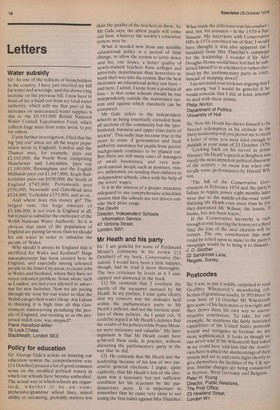Policy for education
Sir: George Gale's article on insuring our education system the comprehensive way (14 October) poured a lot of good common sense on the troubled political waters in which our schools have become embroiled. The actual way in which schools are organised, whether it be on comprehensive/grammar school lines, mixed ability or streaming, probably matters less than the quality of the teachers in them. As Mr Gale says, the ablest pupils will come out best, whatever the society's education system may be.
What is needed now from any sensible educational policy is a period of little change, to allow the system to settle down and for, one hopes, a better' quality of newly-trained teachers from colleges and university departments than heretofore to work their way into the system. But the best insurance an educational policy can have — and here, I admit, I write from a position of bias — is that some schools should be run Independently outside the maintained system and against which standards can be compared.
Mr Gale refers to the independent schools as being essentially excluded from all sections of the community but the 'professional, business and upper class Parts of society'. This sadly may become true in the years to come if government and local authority assistance for pupils from poorer backgrounds continues to be phased out. But there are still many cases of managers of small businesses, and very nonprofessional people such as postmen, miners, policemen, etc sending their children to independent schools, often with the help of the wives' wages.
It is in the interest of a proper insurance safeguard to any comprehensive education system that the schools are not driven outside their price range, Tim Devlin Director, Independent Schools Information Service, 47 Victoria Street, London SW1






































 Previous page
Previous page